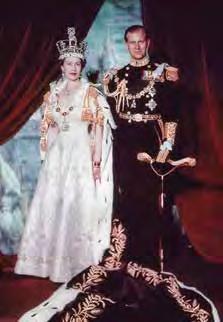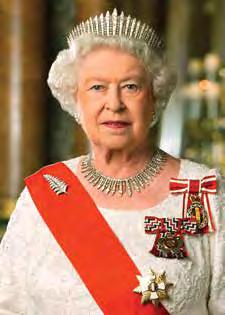
19 minute read
70 Years of Elizabeth II the Servant Queen
In the Queen’s Platinum Jubilee year, we reflect on a beloved figure exemplifying dignity and devotion yet sadly not preserving her realms from moral plummet and decline.
by Melvin Rhodes
I grew up with Elizabeth II, turning one year old a few days before the Queen ascended the throne. When I was seven in 1958, she visited my hometown of Grimsby. I have no idea why she was there. Presumably some of the people in the massive, wall-to-wall crowd did. A man, a stranger, offered to put me on his shoulders so I could get a better view. It was a really warm day, and I remember the Red Cross having to pull a woman out of the crowd who had fainted in the heat.
At my school we used to march into a big hall for an assembly every morning for a daily scriptural reading and a hymn. As we turned to actually enter the hall, there was a beautiful portrait of the Queen— Pietro Annigoni’s masterpiece, still one of my favorite paintings.
We always marched to classical music. Often it was “royal” music, having been specially written for royal occasions. Handel was one of the composers, a German who had settled in England in 1712, taking British citizenship 15 years later.
We didn’t grow up blindly loyal to the Queen—my father being very much against royalty—but she was always there, the symbol of the nation. I remember later hearing while on a visit to San Francisco in 1977 that hers was the most distributed vignette in history. After all, she was on all our coins and bank notes and on every postage stamp. Other nations also have the Queen’s image on coins and bank notes.
In 1964 Britain elected a Labor (socialist) government. I remember two years later, when many thought socialism was the way to go, a cartoon in one of our newspapers showing the Queen and her husband, Prince Philip, standing on the balcony at Buckingham Palace with a thin crowd in the Mall, the roadway leading up to palace. Philip turned to his wife and said: “Never mind, dear. You’re still top of the pops in Australia.” At that time, 56 years ago, the monarchy was more popular in Australia than it was at home in England.
Today, at 96, the Queen herself has a consistent popularity rating of over 70 percent, higher than any politician on either side of the Atlantic. Even at the lowest point, following the death of Princess Diana in 1997, there was no widespread thought of turning Britain into a republic with a figurehead president replacing the monarch.
Throughout my life, she has always been there. When we lived in Rhodesia all the coins had Elizabeth II on them. When we moved to Ghana the meeting hall we used for church services had a plaque on the wall saying it was opened by the Queen in 1961.
What has made her so popular?
Princess Elizabeth’s promise
I think it goes back in large measure to the promise she made on her 21st birthday:
“I declare before you all that my whole life whether it be long or short shall be devoted to your service and the service of our great imperial family to which we all belong.”
Those words were spoken by then Princess Elizabeth. She and her family were touring South Africa and Southern Rhodesia at the time to thank the peoples there for their support during World War II. Her father, George VI, was then monarch, the king of both countries.
“The high point of the journey for Elizabeth was her twenty-first birthday on April 21st. South Africa celebrated her coming of age as a national holiday with military reviews, a ball in her honor, fireworks and a necklace of 21 diamonds presented by [Prime Minister Jan] Smuts” (Sally Bedell Smith, Elizabeth the Queen, 2012, p. 37.)
“Her remarks, which were broadcast from Government House in Cape Town ‘to all the peoples of the British Commonwealth and Empire,’ lasted six minutes” (ibid.).
The words were a personal vow, dedicating her life to the quarter of the world’s people that lived within the empire and Commonwealth.
Less than five years later her father died, and Princess Elizabeth became Queen while on an official visit to Kenya, at the start of a Commonwealth tour that had to be postponed until 1954. It was February 6, 1952.
“While carpenters at Sandringham were building a coffin of oak from the estate, cinemas and theatres were closed, BBC programs were canceled, except for news bulletins and solemn music, public functions and sports fixtures were postponed and flags flown at half-mast. For the three days of official mourning, men were urged to wear black armbands and black ties. In the 1950s, the death of the monarch was seen as a huge jolt to the political and social structure.
“George VI had reigned at an exceptional time in British history. By remaining in London throughout the Blitz, he had come to be the living symbol of the country’s determination to defeat Nazism. For this, he and his family, who might easily have decamped to a haven in Canada, earned universal respect. Hearing of his death there were those who feared that the heart had gone out of the nation. The young Queen was well aware of this. Schooled to put duty before all else, she was determined that there should be no letting up in the standards set by her father and his father, George V, before him.
“At her first Privy Council she made her Accession Declaration, resolving to follow her father’s example of service and devotion. And in a broadcast to the nation, she looked forward to her coronation for which she was preparing ‘with prayer and meditation.’ She appealed to her audience to ‘Pray for me on the day. Pray that God may give me wisdom and strength to carry out the solemn promises I shall be making’” (Barry Turner, “The Making of Our Queen,” The Telegraph, Feb. 5, 2022).
So commenced what was often called “the Second Elizabethan Age.” It began with great promise— New Zealander Sir Edmund Hilary became the first man to conquer Mt. Everest, the news reaching London in time for the newspapers on Coronation Day.
What followed has been 70 years of dutiful service to Britain and the Commonwealth. For this reason Elizabeth has earned the epithet “The Servant Queen.”

A changed world under Elizabeth’s reign
But it has not been a second Elizabethan age. Whereas the first Queen Elizabeth (1558-1603) laid the foundation of the British Empire, the reign of the second Queen Elizabeth was marked by the dismantling of that same empire.
“The great imperial family” she spoke of in 1947 has gone, replaced by a Commonwealth of Nations, the members of which are independent and often quite critical of Britain. Most have priorities quite different from those of Britain and the rest of the Commonwealth. If the Second World War took place again, it’s doubtful the Commonwealth countries would come to Britain’s aid. In 1939 they all did, with India contributing 2.5 million men, the biggest volunteer army in history.
Few Britons see clearly how steep has been the country’s decline.
Elizabeth herself must realize it. Soon after her marriage in 1947 she was a navy wife, stationed on the island of Malta, which was then a major British naval base. In 1979 the British voluntarily withdrew. Both economic power and the military have seen a stark decline during her reign.
In the year of her marriage, Britain had more than 1.25 million men under arms. Now, after successive cuts, there are fewer than 200,000 military personnel.
It can be said that Queen Elizabeth II has helped keep Britain stable during this long decline. That’s one way of looking at it. Looked at another way, however, Britain is not as secure as she was.
The monarchy gives Britain a great deal of influence. Not only is Queen Elizabeth II Britain’s head of state, she is also, for historical reasons, head of state in Canada, Australia and New Zealand (in Australia she is known as the Sovereign).
She retains the same office in a number of smaller countries, in the Caribbean and the Pacific. Retaining the monarch has given these nations a stability they otherwise might have lost. There are now 15 Commonwealth Realms.
Additionally, there are 54 member countries of the Commonwealth. Though most of these are now republics, the Queen is the head of the Commonwealth, and member nations voted at their last meeting to recognize Prince Charles as head of the Commonwealth when the time comes.
The Queen tries hard to keep member nations on the straight and narrow, using her influence to help everyone stay on the democratic path. An article in Newsweek 20 years ago, on the 50th anniversary of her reign, said nobody had done more to spread democracy than Elizabeth II.
In her 70 years on the throne, she has had 179 prime ministers, counting those of the United Kingdom and the 15 Commonwealth Realms.
Former Canadian Prime Minister Brian Mulroney observed: “The Queen knows that when she enters the room she is the most compelling head of state in the room. She is number one even though her country is not number one” (quoted by Smith, p. 491).
A biblical vow ultimately proven empty
It’s not just the empire that Britain has lost in the last 70 years. The nation’s morals are today totally contrary to what they were at the time of the coronation in June 1953.
During the coronation ceremony, the Archbishop of Canterbury asks the following:
“Will you to the utmost of your Under the second Elizabeth the Bible has been almost totally rejected by the nation. Each week more people attend a mosque than a church. power maintain the Laws of God and the true profession of the Gospel?

“Will you to the utmost of your power maintain in the United Kingdom the Protestant Reformed Religion established by law?
“Will you maintain and preserve inviolably the settlement of the Church of England, and the doctrine, worship, discipline, and government thereof, as by law established in England?”
The British monarch is the titular head of the Church of England. She was asked here if she would maintain the laws of God and the doctrines of the Church, as she understood them. But here there has been a total reversal, not just in Britain but in the other Commonwealth nations of British descent—Australia, Canada and New Zealand. These nations have pioneered social change in the last 60 years, whether it be abortion, divorce, same-sex marriage or other LGBTQ promotion.
The Queen, as head of state, has had to sign off on all these changes.
After seven decades on the throne you would think the Queen’s political views would be known. But that is not the case. She has been an exemplary constitutional monarch. But this has meant her silence on the critical issues mentioned—and on the multicultural transformation that has totally changed Britain. Her annual Christmas broadcast has often highlighted developments in this area. To a certain extent, she bears responsibility in some of the anti-biblical legislation that has been embraced by the politicians, if not by the people.
After promising to fulfill what was asked of her in the coronation, she was then presented with the Bible along with these words: “Our gracious Queen: to keep your Majesty ever mindful of the law and the Gospel of God as the rule for the whole life and government of Christian princes, we present you with this Book, the most valuable thing that this world affords.”
The moderator then continued in accordance with the ceremony: “Here is Wisdom; this is the royal Law; these are the lively Oracles of God.”
Now that Britain has entered a post-biblical age, it’s likely the above will not be included when Prince Charles inherits the throne. The striking aspect of the coronation service is the preeminence given to the Bible as the rule of law.
This is a major difference between the first Elizabethan Age and the second. Under Elizabeth I the country had only recently broken with Rome. It was an enthusiastic Protestant country determined to preserve its religion against the power and might of the Roman church. Under the second Elizabeth the Bible has been almost totally rejected by the nation. Each week more people attend a mosque than a church. As for the Queen herself, she still attends church regularly, even when she is on holiday.
A commemorative book published in 2016 for her 90th birthday was titled The Servant Queen and the King She Serves. It declared: “The Queen works hard because she is committed to service. And that comes from her commitment to follow the ways of Christ” (p. 23). Stressing that she looks to the Bible as her inspiration, the book quoted from it: “In your relationships with one another, have the same mindset as Christ Jesus: who, being in very nature God, did not consider equality with God something to be used to his own advantage; rather, he made himself nothing by taking the very nature of a servant” (Philippians 2:7, quoted on p. 26).
I’m not aware of any other country that has changed as much as Britain in the last 70 years. When the Queen passes from this life, the country may fall apart. The United Kingdom is made up of four countries (England, Scotland, Wales and Northern Ireland). All four look to Elizabeth II as their leader. Already, Scotland has a big independence movement. Northern Ireland’s relationship with London is insecure since Brexit.
The United Kingdom will have come full circle. At the time of the first Elizabeth, there was just England and Wales. With the empire now gone, if anything should happen to the United Kingdom there may be nothing left except England and Wales—and both only a shadow of their former selves.
Such massive shifts in geopolitical power and in Western nations’ declining morality were foretold as a hallmark of the time of global turmoil leading up to the establishment of a coming Kingdom that will never end—that of the ultimate King and Messiah, Jesus Christ!
LEARN MORE
Surprisingly, the British nation and monarchy can be traced back to promises God made in the Bible concerning their rise and fall. Be sure to request or download our free study guide The United States and Britain in Bible Prophecy, and also read our online publication The Throne of Britain: Its Biblical Origin and Future.
BTmagazine.org/booklets
Check us out online!
Appreciation and thanks for study guides and Beyond Today
Peace and love to you from distant Russia! In these days of criminal war, your gospel word is very important! I am very grateful to you for your preaching and for your prayers. With gratitude, I received from you a package with six precious publications that carry the good news from the Holy Bible about the coming Kingdom of God.
Reader in Russia
I have read your study guide Why Were You Born? It is the most amazing book I have ever read. The reasons you write about are so incredible that one finds it hard to believe! But when we read what is plainly written in Scripture it becomes the most fascinating potential for mankind. And what is also astonishing is why so many don’t see what you see! Reader in the United Kingdom
I received your study guide You Can Have Living Faith. Since I am struggling with life experiences, it really served as a source of comfort for me. Reader in New York
Thanks for sending regularly Beyond Today, which is very informative and provides spiritual guidance.
Subscriber in Pakistan
Reader responses to recent Beyond Today articles
Regarding your issue on “What If Sodom Has Been Found?”—it is rather stunning to have such a discovery be made and yet have much of the media dismiss it immediately as nothing significant. It has been said to be just a chance encounter with a meteorite, from which a myth sprang up about Sodom and Gomorrah. The majority of people in this world are sleepwalking, spiritually speaking. Hopefully some people will look at all the evidence and wake up to the destruction we are heading into. From the Internet
What an outstanding issue that last one was. I love the in-depth archaeological proof you’ve shown to prove the biblical history of the Old Testament and the life of Jesus. Great job on that. I’ve always loved reading your magazine. I don’t always agree with some of your traditions, but you do preach a sound biblical teaching. We need to focus on knowing Jesus so we can be like Him. And you do that. Your articles are full of good biblical teaching. Thank you for putting out such an informative magazine. God’s blessings to you all.
Subscriber in Michigan
I wanted to offer my sincerest thank you for this excellent piece, “Seven Scientific Proofs of God.” As a certified biology teacher, researcher and statistician, I have sometimes been troubled by the little bit of knowledge accrued in my past education, I think mostly from my unperfected love and faith, try as I might. Your article was so well-written and convincing, I was moved to tears when I finished. Thank you, thank you, thank you! From the Internet
Visit Beyond Today on Facebook!
Are you on Facebook? If so, visit our Beyond Today magazine page. See what other readers are saying. Find links to interesting articles and Web commentaries. Become a Beyond Today magazine Facebook fan!
I really enjoy Beyond Today magazine. It gives a good understanding of the Bible and highlights information not given in mainstream Christian faiths. I highly recommend this magazine to all. – K.T., Facebook fan
Reader question about hell
I just wanted to discuss your belief that eternal torment in hell is not the punishment of the wicked. I’m concerned that pushing this idea of hell not being an eternal punishment is harmful to new believers and also nonbelievers. There are so many verses that insist on the punishment being eternal. This was honestly the hardest part of Christianity for me to come to terms with, but it is the truth.
I encourage you to seek truth at all costs. I’m afraid that this sort of teaching is what 2 Timothy 4:3 refers to as “tickling the ears”—this idea that the punishment isn’t that bad. This promotes complacency and takes away from the magnitude of what Jesus did for us. Please consider asking God to lead you to the truth. I’m happy to discuss this at length if you’re interested!
From the Internet
Thank you for your letter. Our teaching is based on a careful study of all the relevant scriptures and history. Throughout the Bible those who die are described as being “asleep” (1 Corinthians 15:18; 1 Thessalonians 4:14), who “know nothing” (Ecclesiastes 9:5), and who await a resurrection to judgment (Daniel 12:2; John 11:24). After that resurrection—which takes place at a future time after the return of Jesus Christ—that judgment will reward some with eternal life (2 Timothy 2:10-13). But that judgment will also bring punishment for the incorrigibly wicked, who actively choose to disavow God and refuse His offer of salvation (Revelation 20:14-15; 21:8).
And yes, that punishment will be eternal; it will be irreversible (Matthew 25:46). But it will not be eternal torment, as many assume. Instead it will be a merciful eternal death (the "second death" in verses just cited).
The apostle Paul succinctly explains the biblical truth of the final judgment of human beings: “For the wages of sin is death, but the gift of God is eternal life in Christ Jesus our Lord” (Romans 6:23). Notice that the wages of sin are not an eternal life of torment in hellfire, but “death”—the cessation of life. Immortality is a gift for only those who submit to God and choose to live His way.
In short, God is merciful, even to those who hate Him—whom He will destroy completely, never to live again. This is truly a terrifying—and eternal —final judgment of death. All this is covered in much greater detail in our free study guide Heaven and Hell: What Does the Bible Really Teach? Those interested can download or request it for free at ucg.org/booklets.
Published letters may be edited for clarity and space. Address your letters to Beyond Today, P.O. Box 541027, Cincinnati, OH 45254-1027, U.S.A., or email BTinfo@ucg.org (please include your full name, city, state or province, and country).
UNITED STATES NATIONWIDE CABLE TV
i24NEWS TV View on cable: Sunday 8 a.m. ET, 7 a.m. CT, 6 a.m. MT and 5 a.m. PT THE WORD Network View on cable:
Sunday, 10:30 p.m. ET, 9:30 p.m. & 11:30 p.m. CT, 8:30 p.m. & 10:30 p.m. MT, 7:30 p.m. & 9:30 p.m. PT & Monday, 12:30 a.m. ET BROADCAST TV

Alabama
Huntsville/Decatur/Florence ch. 15, Sun 6 a.m.
Alaska
Anchorage ch. 18, Tue 9 p.m.
Arkansas
Fort Smith/Fayetteville/Rogers/Springdale ch. 24, Sun 10 a.m.
California
San Diego ch. 18, 19, 23, Mon 5 p.m. San Francisco ch. 29, Sun 6:30 p.m. San Francisco/Oakland/San Jose ch. 44, Sun 9 a.m.
D.C.
Washington ch. 50, Sun 9 a.m.
Florida
Tallahassee/Thomasville ch. 40, Sun 10 a.m. Orlando/Daytona Beach/Melbourne ch. 18, Sun 9:30 a.m.
Worldwide Television Airtimes
For current airing times or to view programs online, visit BeyondToday.tv
Illinois
Springfield/Decatur/Champaign ch. 55, Sun 10 a.m.
Maryland
Hagerstown ch. 50, Sun 9 a.m.
Missouri
Kansas City ch. 29, Sun 9 a.m.
Ohio
Toledo ch. 69, Sun 6 p.m.







